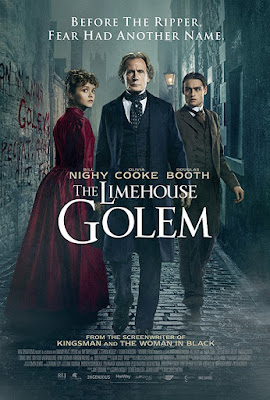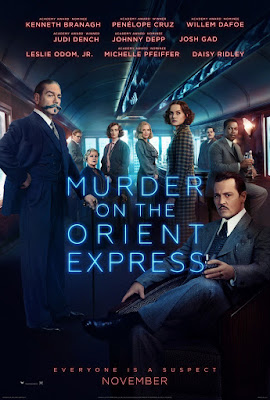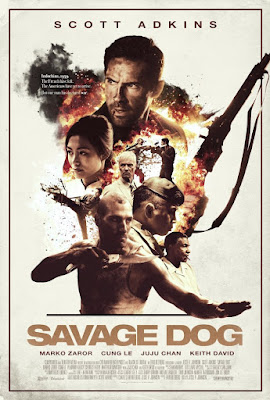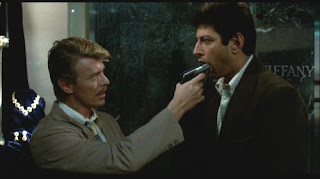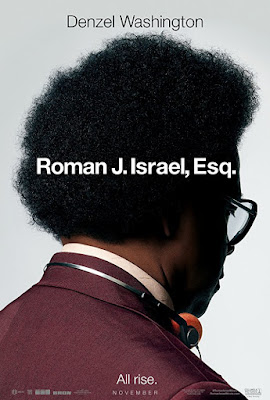VENGEANCE: A LOVE STORY(US - 2017)
Though the title and the poster would indicate this is another by-the-numbers, Redbox-ready Nicolas Cage VOD actioner--and it gets off to a dubious start with video-burned opening credits straight out of a TV show-- VENGEANCE: A LOVE STORY is a peculiar outlier in Cage's filmography, at least for this stage of his career. Cage originally planned to direct, something he hasn't done since 2002's little-seen SONNY, but at some point before shooting began, he handed the job off to veteran stunt coordinator and second-unit helmer Johnny Martin. Given Martin's pedigree, VENGEANCE: A LOVE STORY is very light on action and stunts, which one might expect once you know it's based on Joyce Carol Oates' 2003 novel
Rape: A Love Story (not hard to see why they went with a slightly more marketable title for the movie). For a while, after a shaky opening and the obvious budget deprivation on display, the Georgia-shot, Niagara Falls-set VENGEANCE does alright as a melancholy, low-key character piece until it gives way to overwrought, deck-stacking melodrama before the "vengeance" element kicks in. Taking a shortcut through the woods at night on their way home from a 4th of July barbecue, single mom Teena (Anna Hutchison of THE CABIN IN THE WOODS) and her 12-year-old daughter Bethie (Talitha Bateman) are attacked by four sub-literate, hillbilly yokels who physically assault Bethie and gang-rape Teena. Glum, burned-out (we know this because he moves pieces on a solitary chess board in his living room) cop and Gulf War PTSD case John Dromoor (Cage) catches the case and gets emotionally invested in it, still shell-shocked and trying to fill a void after the recent death of his partner during a botched arrest.
It looks to be an open-and-shut case, as the four rapists--all brothers--leave ample fingerprint and DNA evidence and are all identified by Bethie in a lineup, but their bitter, white trash mother (Charlene Tilton sighting!) makes her husband mortgage the house to hire slick, high-priced, Harley-riding defense attorney Jay Kirkpatrick (Don Johnson). At a preliminary hearing, Kirkpatrick tries to establish that Teena seduced the brothers, launching a town-wide smear campaign to slut-shame the victim, even questioning her competency as a parent. Kirkpatrick is also friends with the judge (Mike Pniewski), who overrules every objection from Teena's lawyer (Kara Flowers) and takes petty offense to grammatical errors in Dromoor's testimony ("It's 'my partner and I,' detective...not 'me and my partner'"). The brothers are released on bail and begin terrorizing Teena and Bethie, kill Teena's mother's (Deborah Kara Unger) cat, and intimidate witnesses, and then the judge moves the trial date up to give Teena's lawyer as little time to prep as possible. Seeing that Teena is getting a raw deal, Dromoor does what lone wolf cops in formulaic movies with the word "vengeance" in the title do. It takes about 75 of the film's 99 minutes for the vengeance to commence, but even after that, Cage turns in maybe the quietest performance of his career. He never even smiles. Johnson, who's become a great character actor in recent years (
COLD IN JULY,
BRAWL IN CELL BLOCK 99), delivers another terrific performance in a movie seen by no one. Hutchison and young Bateman are very good, at least until the script by TV vet John Mankiewicz (a writer on MIAMI VICE, a producer on HOUSE M.D. and HOUSE OF CARDS, and creator of the short-lived 1990s Jeff Fahey series THE MARSHAL) starts asking the audience to buy too many implausibilities. There's no way a judge would behave like this one does, and there's no way a defense attorney would sit there and let his clients leer at and threaten someone who's accusing them of the crime for which he's defending them, right there in court. By the end, VENGEANCE: A LOVE STORY never lives up to its potential. It's too hokey and lacking in nuance and subtlety to be taken seriously, but it's too restrained and slow-moving to work as a dumb action thriller. It's earnest and well-meaning, but it can't reconcile its goals and decide what it wants to be. Cage and long-retired ONION FIELD and VISION QUEST director Harold Becker, who hasn't made a film since 2001's DOMESTIC DISTURBANCE, were among the producers.
(Unrated, 99 mins)THE LIMEHOUSE GOLEM
(UK - 2017)
Based on Peter Ackroyd's 1994 novel
Dan Leno and the Limehouse Golem, the Jack the Ripper-inspired British mystery THE LIMEHOUSE GOLEM falls victim to some tedious stretches in its first half, but it gets better as it goes on. Even during its slow spells, it's a pleasure to watch just for the opportunity to enjoy the great Bill Nighy in a rare lead, brought in as a last-minute replacement for Alan Rickman, who hoped to make the film despite his pancreatic cancer diagnosis but was forced to back out when his health began rapidly declining just before filming began in October 2015 (Rickman died in January 2016). Of course Rickman would've been perfect (the film is dedicated to him), but Nighy is superb as Inspector John Kildare, a weary Scotland Yard official in 1890 London who gets the case of a serial killer known as "The Limehouse Golem" dumped in his lap. At the same time Kildare inherits the case, he finds a link to another involving stage actress Elizabeth Cree (Olivia Cooke), accused of poisoning her husband John (Sam Reid). Kildare finds a journal with insane rantings that may implicate John as the Limehouse Golem, though the investigation leads to other suspects, including real-life figures like music hall comedian Dan Leno (Douglas Booth), novelist George Gissing (Morgan Watkins), and even Karl Marx (Henry Goodman). Partnered with constable George Flood (Daniel Mays), Kildare up-ends the Limehouse district to find proof John Cree is the killer, hoping that if Elizabeth is convicted of poisoning him, she can be spared execution for putting an end to the Golem's reign of terror.
Low-key despite some occasional flashes of splatter, THE LIMEHOUSE GOLEM almost plays like an R-rated PBS mystery. Director Juan Carlos Medina and screenwriter Jane Goldman (KICK-ASS, THE WOMAN IN BLACK, both KINGSMAN movies) spend a little too much time in the first half on Leno's theatrical troupe, often veering from a murder mystery into a redux of Mike Leigh's TOPSY-TURVY. But once all the pieces are in place and everything involving Elizabeth's hellish upbringing and John's insane jealousy over her friendship with Leno and that her career is taking off while he languishes as a failed playwright is established, THE LIMEHOUSE GOLEM takes off and becomes a riveting suspense piece, anchored by terrific performances from Nighy and Cooke (
THE QUIET ONES). The production design and period detail are big pluses, with London looking about as gray, bleak, and grimy as it did in the 1979 Sherlock Holmes classic MURDER BY DECREE. It's not quite on the same level, but Nighy's Kildare--a complex character whose closeted homosexuality makes him the object of hushed scorn and dismissal among his colleagues, even though there's a cryptic moment where a sympathetic Flood whispers "I'm on your side"-- is ample proof that the actor would make a great Holmes.
(Unrated, 109 mins)
GUN SHY(US/UK - 2017)
You probably won't find a worse comedy in 2017 than GUN SHY, a staggeringly awful adaptation of Mark Haskell Smith's 2007 novel
Salty, which garnered some acclaim at the time for its Carl Hiaasen-esque comic mystery crossed with an Irvine Welsh sense of the grotesque. Smith co-wrote the screenplay, but everything that book reviewers liked about
Salty appears to have been neutered into oblivion for GUN SHY. This is a film where it's abundantly clear that the endgame was a mystery for all involved. The humor here isn't clever, it isn't sly, it isn't raunchy...it isn't anything. The film plods along, gasping and wheezing to its conclusion without a single laugh or even a remotely humorous moment. Gags fall flat, the story goes nowhere, and the actors look completely stranded. It's not like there's a lack of talent here: Antonio Banderas and Olga Kurylenko are fine actors, and Simon West isn't an auteur by any means, but he's directed some entertaining movies (CON AIR, THE GENERAL'S DAUGHTER, THE EXPENDABLES 2, THE MECHANIC), but GUN SHY is one of those rare instances where, whatever the intent was going in, nothing works. It's painfully unfunny and miserable to endure, and the only thing saving it from complete ruin is that Banderas actually seems to be enjoying himself. Between recent VOD duds like
BLACK BUTTERFLY, FINDING ALTAMIRA,
SECURITY, and now this, Banderas is due for either a new agent or an intervention.
Banderas is Turk Henry, former bassist/vocalist for the '80s hair metal band Metal Assassin, best known for their hit single "Teenage Ass Patrol." Kicked out of the band after his supermodel wife Sheila (Kurylenko) was deemed a "Yoko" by the other members, Turk's career and personal life are in the toilet. Now an emotionally needy, drunken recluse who still dresses like "Dude (Looks Like a Lady)"-era Steven Tyler, he hasn't left his Malibu mansion in two years, prompting Sheila to arrange a vacation to Turk's native Chile in an attempt to boost his spirits. Once there, she's kidnapped by a group of neophyte pirates who think they've struck gold and try to extort a huge ransom when they realize she's Turk Henry's wife. Turk's manager sends his assistant Marybeth (Aisling Loftus) and Clive Muggleton (Martin Dingle Wall), a Crocodile Dundee-like Aussie mercenary with impossibly white teeth and a serious shellfish allergy, to help Turk negotiate with pirate leader Juan Carlos (Ben Cura). US Homeland Security gets wind of the kidnapping and sends ambitious CIA agent Ben Harding (Mark Valley), who's quick to label it a terrorist act in order to boost his profile to his superiors. What follows is a lot of shameless mugging and dead air as entire sequences go by with nothing even remotely amusing, unless you count a vomiting llama, Turk getting bitten on the dick by a snake, Turk trying to dodge Harding by dressing in drag, a clueless Turk calling his GPS a "CGI," and mispronouncing easy words, like "tore-toys" for "tortoise." The novel had the vacation taking place in Thailand, with a hapless, shaggy dog Turk getting involved in busting a sex trafficking ring. Here, he's just a bumbling buffoon making an ass of himself in Santiago. There's no attempt at political satire, no attempts at physical comedy, and no attempt at any INHERENT VICE or BIG LEBOWSKI-style absurdist noir humor. No, the only thing the makers of GUN SHY had was "Antonio Banderas dressed up like a hair metal singer" and they just assumed everything would work itself out. GUN SHY is so lazy that it doesn't even have any insider, THIS IS SPINAL TAP-style jokes about the music industry. There's nothing here, though Banderas, not an actor known for his comedic skills, looks like he's having fun despite his helpless, idiotic character having absolutely nothing to do. As if GUN SHY wasn't oppressive enough, it pads out the running time by including four endings, two music videos during the closing credits, and
three (!) post-credits stingers, as if anyone watching this would think "Wow, I had such a blast with these characters...just keep giving me more!" This is stunningly bad.
(R, 92 mins)













































